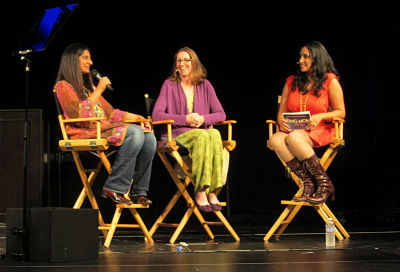I’m going to try and keep this post short and to-the-point. A handy toolkit to ease the stress of mothering, regardless of the “brand” of mothering (working, stay-at-home, by fathers, you name it). This is a summary of the gems that emerged from my appearance this week with Mallika Chopra and Sarah Ripard at the California Women’s Conference. The audience loved what we shared, so I wanted to share it more widely.
 First, why do so many of us tend towards feeling overwhelmed with the stress of mothering these days? Since humans are by nature meaning-making creatures, it helps a great deal to shine a light of context on any problem. In this case it helps us to not feel crazy, or incompetent, or alone in our suffering!
First, why do so many of us tend towards feeling overwhelmed with the stress of mothering these days? Since humans are by nature meaning-making creatures, it helps a great deal to shine a light of context on any problem. In this case it helps us to not feel crazy, or incompetent, or alone in our suffering!
Here are The Big Three as I call them: overarching reasons for what seems like an epidemic of anxiety that thrums at the heart of parenting:
Too much information — Word on the street is, the world now produces more information in 48 hours than it did throughout human history up till 2003! But while technology has careened forward and changed our world dramatically, human beings haven’t much changed — in how we’re built or how we function — in thousands of years! So this bombardment is a kind of trauma, just too much for the nervous system to process.
Too many choices — We owe our mothers and grandmothers such a debt of gratitude for all the opportunities that resulted from the women’s movement. But this is a sword that has cut both ways — certainly slashing away barriers and opening many new avenues to us women who came after; but the other cut is that all these choices and freedoms can lead to a sort of “choice paralysis.” What if we choose wrong??!
Too little confidence — One of the most common problems I see in my coaching practice is parents not feeling the inner confidence to hold the authority their child needs them to. Messages in our culture (particularly the media), and echoes from own childhood histories conspire to throw us back on our heels and make us feel like we’re not quite up to the task of doing a good job parenting our children.
The great news is that this trifecta of fear can be turned around fairly simply! If you switch just TWO letters in the word, “scared” becomes “sacred”…and it’s just about a few small shifts. Everyone who attended came away with a handy, powerful toolkit for mastering The Big Three.
Mallika led us in a lovely, simple, meditation taught her by her father Deepak: “On the in-breath say to yourself ‘I’ and on the out-breath say to yourself ‘am’ — ‘I’… ‘am’… ‘I’… ‘am’…”). Even just a couple minutes of this brief meditation was amazingly centering for all of us!
The three tools I proposed all featured questions (as I quoted the Buddhist mindfulness monk, Thich Nhat Hanh: “The vitality is in the question”) —
1. The question (before saying / doing anything): Will this foster growth mode, or protection mode? Of course I first explained the basic concept of growth v. protection –the mainspring of Parenting for Peace: at every moment we are either in growth mode or protection mode, at every level in our bodies, minds and spirits. Right down at the cellular level, we are continually monitoring the environment with the question, Are conditions are safe and secure, so I can grow to my fullest potential, or are conditions threatening, even subtly, so I must instead devote my energies toward protection? This process has especially huge implications for babies, toddlers and children — whose neural circuitry is just wiring up and whose brains are growing so rapidly…or should be. (The key human stress hormone cortisol is highly neurotoxic, meaning it kills brain cells.
2. Presence practice, especially meditation — This was perfect, coming right after the beautiful illustration of Mallika’s meditation. Not only has meditation emerged in the research as a superstar promoter of physical, emotional and spiritual wellbeing, it offers a lesser-known “secret bonus” for parents, which greatly eases daily disciplinary stresses: It helps parents answer Yes to this question: Do I as a parent have mastery over something as fundamental and basic as the flow of my own thoughts? Children wordlessly pick up on our level of self-possession, so when the answer is yes, this engenders a respect for you that is deep, abiding and which rarely wavers. Discipline becomes a far less daunting issue!
3. A mirror, with the question written on it, Am I worthy of my child’s unquestioning imitation? As daunting as this is, best to make peace with the scientific fact that in myriad ways, our kids become us. Our children model themselves on us, right down to the neurobiological download of their social brains wiring up to emulate ours. The bottom line is, Work on yourself and your child will thrive. Sarah, Mallika and I commiserated about how this is NOT about perfection (it was great to hear Deepak Chopra’s daughter matter-of-factly state that she doesn’t meditate every day!), but about striving. There is scientific evidence to show that striving — through beginning to cultivate that presence, that mindful mastery of the flow of our thoughts, of our own inner lives — changes the brain!
Together we can all make choices that ease the stress of mothering.
Together we can all begin the shift… from scared to sacred.

Mallika Chopra, Dr. Marcy Axness, Sarah Ripard | California Women’s Conference
Image:
Photo by Simran Sood on Unsplash
Tags: anxiety, California Women's Conference, discipline, information overload, parent confidence, stress


